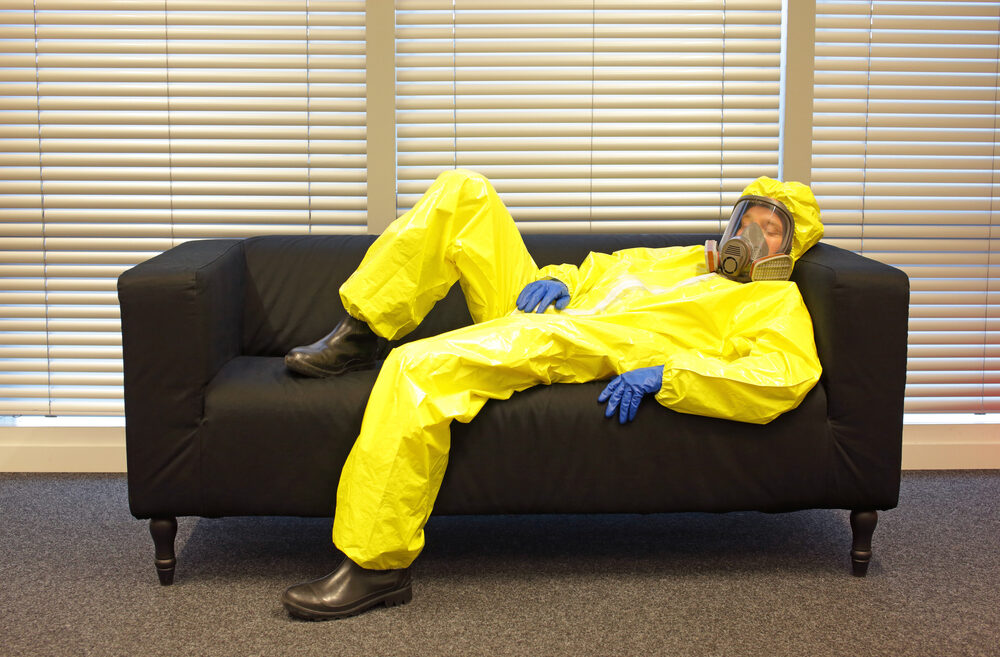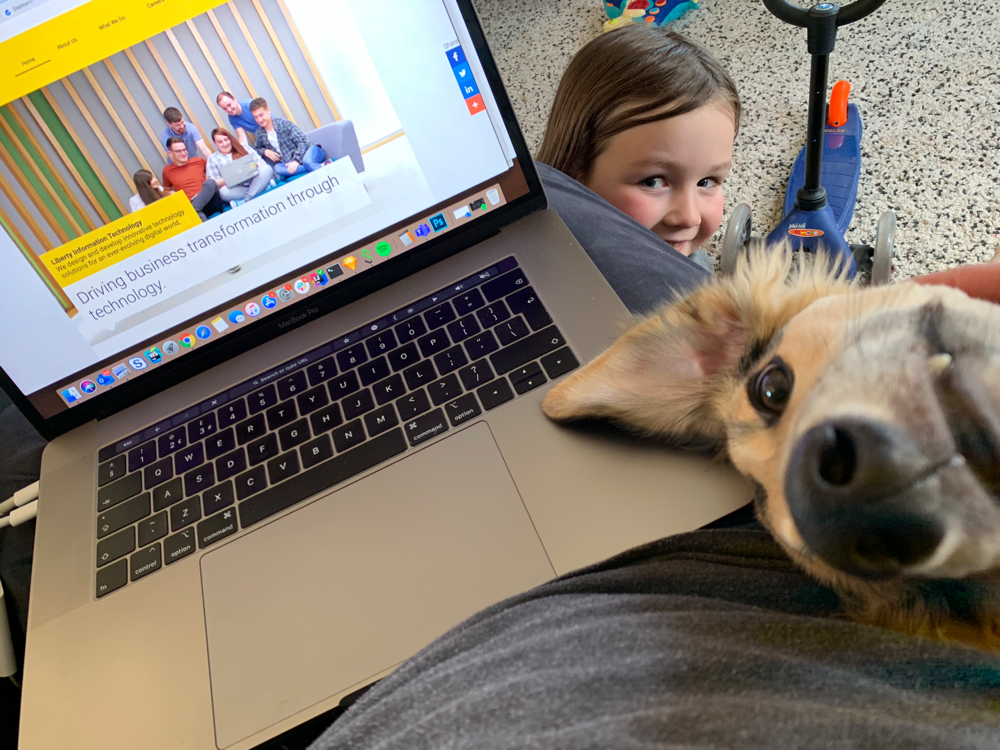Due to the COVID-19 outbreak, citizens around the world are faced with the reality of carrying on everyday routines within their home, including telecommuting and schooling. Staying home is essential for “flattening the curve” and preventing the spread and potential exposure of COVID-19, but the change in routine is leaving many in unfamiliar territory – especially when it comes to leading a healthy lifestyle.
Here are some tips for staying healthy during home quarantine:
- Keep a clean home environment. If you must venture out to the grocery store or pharmacy, be mindful that contact with other individuals increases your risk of being exposed to COVID-19 and spreading bacteria. Reduce your risk of spreading germs in the home by:
- Immediately washing your hands with soap for 20 seconds or longer upon each return home
- Cleaning and disinfecting high-touch surfaces daily, including door knobs, light switches, remotes, toilets and sinks
- Keep your workouts going virtually. With many states mandating closures of public facilities, including gyms, those who have committed to a fitness routine are finding themselves in a bind. Fortunately, there are plenty of exercises that can be done at home with little or no equipment, such as:
- Taking a long walk around the neighborhood
- Watching a yoga video on YouTube
- Performing bodyweight exercises, such as push-ups, pull-ups, wall squats and sit-ups
- Take a free class online like those offered by Tilton Fitness.
- Try to stick to a meal schedule. If you have stocked up the kitchen in preparation of being quarantined, you or your family member may be finding it difficult to follow a regimented meal plan and feel inclined to reach into the cabinets for extra snacks throughout the day. Meal preparation and designated meal times will help to:
- Regulate consumption and prevent overindulgence
- Ensure a well-balanced diet
- Avoid the temptation of ordering take-out foods that can be highly processed or packed with more saturated or trans fats
- Take care of your mental health. While it’s important to stay abreast of the latest information regarding COVID-19, it’s easy to become wrapped up in the information about the pandemic, increasing stress and anxiety levels. Stress-reducing strategies include:
- Giving yourself breaks from the news and social media
- Getting plenty of sleep
- Practicing meditation
- Engaging in video chat with friends and family
- Stay hydrated. Adequate water and fluid intake helps to keep your body strong and have the ability to fight off viruses and infection, but inevitable home distractions may get in the way of ensuring you’re drinking enough water. Follow hydration techniques such as:
- Tracking fluid intake through various apps that are available
- Drinking a glass of water before every meal
- Adding natural flavor to water through fruit infusion
- Utilizing a large reusable water bottle
- Replacing other drinks like soda or coffee with water or seltzer

I Think I Have Coronavirus, Now What?
If you think you’ve been exposed to COVID-19 or are developing symptoms associated with the illness, follow these steps to help protect yourself and others from getting sick.
If you’ve been exposed to someone who has tested positive for COVID-19:
- Stay home and monitor your symptoms. COVID-19 causes flu-like symptoms including:
- Fever or chills
- Cough
- Shortness of breath or difficulty breathing
- Fatigue
- Muscle or body aches
- Headache
- New loss of taste or smell
- Sore throat
- Congestion or runny nose
- Nausea or vomiting
- Diarrhea
- Avoid touching your face, nose and eyes and practice good hygiene such as washing your hands and cleaning “high touch” surfaces often
- Avoid contact with others for at least 14 days even if symptoms have subsided.

If you exhibit symptoms:
Make a Call First
If you continue to experience mild symptoms including respiratory symptoms with fever and cough or if symptoms have worsened, you should utilize a telemedicine app or call your Primary Care Physician or nearest Urgent Care Facility.
Using telemedicine instead of an office visit helps patients and caregivers avoid unnecessary exposure to COVID-19. Many physicians, including those at Hackensack Meridian Medical Group, now offer virtual office visits.
For Urgent Care Facilities, you should call first for an initial phone consultation to screen for COVID-19 to avoid contact with other patients.
If you have a primary care physician, please call their office for initial over the phone consultation as well.
If a Visit is Required
If, after your initial phone consultation, the clinician advises you visit a care facility for further evaluation, please remember to call to let the facility know when you will be arriving. Caregivers in our patient care locations have rigorous precautions in place to reduce further spread of the virus either to other patients that do not have COVID-19 or the medical staff treating you.
When an Emergency Department Visit is Appropriate
If you are experiencing severe symptoms that you believe to be related to COVID-19, it is appropriate to go to the emergency department. Some emergency warning signs include*:
- Difficulty breathing or shortness of breath
- Persistent pain or pressure in the chest
- New confusion or inability to arouse
- Bluish lips or face
*This list is not all inclusive. Please consult your medical provider for any other symptoms that are severe or concerning.
If you are experiencing a life-threatening emergency, you need to call 9-1-1 and go to the emergency room.

Home Isolation
If your health care provider suspects you have a mild case of COVID-19, isolate at home. Here’s how:
- Restrict activities outside of your house, except for getting medical care as instructed by a health care professional. Don’t go to work, school or public places.
- Avoid public transportation, such as buses, taxis or other ridesharing options.
- Separate yourself from others at home. If possible, stay in a separate room and use a separate bathroom.
- Don’t handle pets or other animals while sick.
- Wear a face mask if you must be near other people (such as in a car or sharing a room).
- Always cover coughs and sneezes with your elbow or use a tissue. Throw the used tissue out in a lined trash can immediately and wash hands with soap and water (the right way) afterwards.
- Wash hands often for at least 20 seconds, using soap and water. If soap and water aren’t available and your hands are not visibly dirty, use a hand sanitizer that contains at least 60% alcohol. However, if hands are visibly dirty, always wash hands with soap and water.
- Avoid sharing household items, such as dishes, cups and towels. Wash commonly used items often and thoroughly.
- Clean “high-touch” surfaces every day, such as counters, doorknobs, phones, keyboards and toilets. Use soap and water to clean surfaces and items that are visibly dirty, and then use an EPA registered household disinfectant. Always wear disposable gloves to clean and disinfect.
The decision to discontinue home isolation should be made in consultation with your health care provider and state and local health departments.
Monitor your symptoms
Take your temperature and check for symptoms daily. If your illness worsens, contact your doctor. We can’t stress enough how important it is to call before seeking care so the facility can properly prepare for potential exposure to COVID-19. You should continue to self-monitor for 14 days after exposure to the virus.

Help protect others in your household from getting COVID-19
When someone is on home isolation, it’s normal for others in the household to feel extra anxiety around contracting COVID-19. Follow these steps, in addition to those previously mentioned, to reduce the risk of spreading germs:
- While using a separate bathroom, if available, also use a separate bedroom.
- Restrict visitors who don’t have an essential reason for being in the home.
- Take the lead on caring for any pets.
- Make sure there’s good air flow in the home – using the air conditioner or opening windows if weather permits.
- Wear a disposable face mask and gloves if you have to come in contact with the patient, especially their blood, stool, saliva, mucus, vomit or urine. Throw away after using.




